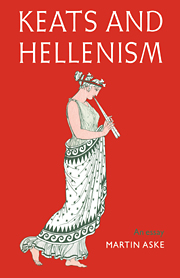4 - The fall of Hyperion
Published online by Cambridge University Press: 14 September 2009
Summary
Endymion may be taken as an example of what a recent critic has called ‘permissible failure’ in Keats. The text's language of flowers errs from the one bare circumstance of given story, and it is the impossible correction of that error which becomes the poem's secret theme. Endymion is about failure, and the potential authority of failure. In poetry as in life, ‘though erroneous’ things ‘may be fine’. At one point Keats passes comment on his ‘slip-shod’ text: ‘Had I been nervous about its being a perfect piece, & with that view asked advice, & trembled over every page, it would not have been written.’ Keats's declaration that ‘I was never afraid of failure’ recalls an earlier remark, à propos Endymion, that ‘one should not be too timid – of committing faults’. One of the faults apparently committed by the poet is to have written a text which offends canonical notions of Grecian simplicity : Endymion does not fit easily into the scheme of antiquity proposed by Winckelmann. Yet perhaps the modern poet should not be afraid of committing faults because some faults are unavoidable, or else in their committing certain truths are disclosed. It may be that the sense of error out of which Endymion is born anticipates the failure of narrative to represent adequately its founding fictions.
- Type
- Chapter
- Information
- Keats and HellenismAn Essay, pp. 73 - 100Publisher: Cambridge University PressPrint publication year: 1985

